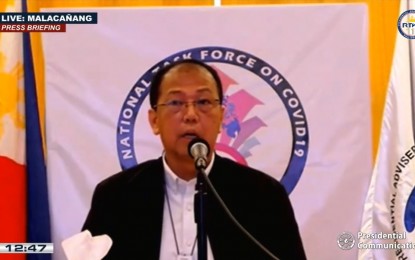
National Policy against Covid-19 chief implementer and presidential peace adviser, Secretary Carlito Galvez Jr. (File photo)
MANILA – National Policy against Covid-19 chief implementer, Secretary Carlito Galvez Jr., on Thursday said the economic reboot is not causing the spike of the coronavirus cases in the country.
"Nakikita po natin na ang spike ng virus (As we see, the spike of Covid-19) is not because we open the economy, but the consciousness of the people and the lack of safety of the people", Galvez said in a virtual press briefing with Presidential Spokesperson Harry Roque.
Galvez said there should be a "change of behavior" among the public to further reduce the risks of infection.
He said the most essential part in curbing Covid-19 transmission is making sure that people are aware of the danger posed by the virus.
As a response, Galvez said the government, with the help of the private sector, is conducting massive education drive on self-protection and health safety awareness.
"Once people are aware, they can go out with confidence that will not be infected by the virus," he said, noting that “prevention” is the most vital response that people could always practice.
"We are informing the public to go out with the caution to always observe the minimum health standards," he added.
Meanwhile, Galvez lauded Metro Manila mayors for maintaining the health protocols and guidelines in place while reviving economic activities.
"They are opening their economy little by little at controlled manner," he said, saying people should learn to embrace the new normal, which requires strict observance of health protocols within public places and workplaces.
NAP Phase 3
On the other hand, Galvez said the government would be implementing the third phase of the national action plan (NAP) against Covid-19 through balancing health and economic recovery.
"We will be looking forward to sustaining our gains from the previous national action plans while providing an equilibrium both (in) our health safety and economic recovery in the implementation of our NAP 3," he said.
Galvez assured that there will be no more trade-offs during the NAP Phase 3.
"The NAP Phase 3 will be our transition plan to the new normal from the last quarter of this year rolling down the road towards the first quarter of 2021," he said.
Galvez said NAP phase 3 is anchored on an effective health risk management while there is a gradual easing of restrictions.
"We should learn to live with the virus until the vaccine is available," he said.
Galvez said there is a need to further strengthen the key areas of prevention and containment approach including the government's Prevent-Detect-Isolate-Treat-Reintegrate (PDITR) strategy.
"We need to strengthen our active case finding in our communities in order to proactive detect the cases even without testing," he said.
Galvez noted that there is a need to establish more quarantine facilities for the infected ones and proper treatment should be provided to them until they are fully recovered.
"We must strengthen the 'no home quarantine policy' which radiately reduces the active cases in Cebu, Navotas, and other parts of the NCR [National Capital Region] and other provinces," said Galvez, citing that the government continues to expand its Oplan Kalinga program to restrict people from undergoing home quarantine.
"The NAP Phase 3 will help us transition to the new normal," he reiterated. "This will provide us the necessary strategic systems and mechanisms that will enable us to jumpstart our economy, and at the same time, to continue to lower active cases until the vaccine is available."
Galvez reminded the public not to be complacent.
"We have seen that if we have lower our guard, cases will go up. A second wave is just around the corner [so] let us continue to observe the minimum health standard," he said. (PNA)
